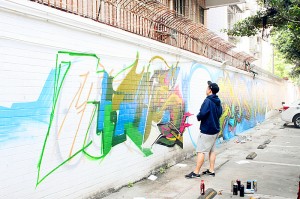When China opened its international markets in the early 1990s, new ideals flooded into the country, resulting in a new dawn where the lives of many youths have challenged the old mindsets and traditions of their culture.
One such person is ‘Bosi’, a local rapper.
In a land of Cantopop and drippy love ballads, Bosi is doing something different. “They look down upon rap or hip hop music because they don’t feel hip hop is a kind of music,” says Bosi, who refers to his parents’ opinion regarding his choice of music. “How come there is no melody? They don’t understand the culture and they don’t enjoy the music.”

Bosi is the product of the one-child policy where individuality is often overshadowed by a ‘parents know best’ mentality.
At 14, Bosi had his first taste of hip hop and rap. A friend had introduced him to the infamous Hong Kong band LMF (Lazy Mutha Fu@#a). The band has been known for its vulgar, abrasive and no-holds-barred attitude regarding society’s injustices from poverty to government corruption.
LMF’s words resonated with the young Bosi.
Eight years later, he is at a place in his life where he must choose to continue honing his craft or abide by the demands of society. “Sometimes, once or twice, I want to give up. I can’t be famous. It’s useless. What do I get from it?”
Bosi’s world is filled with compromises from what he wears on the weekdays as he whiles away at an office to when he should produce his profanity-laced lyrics, knowing his parents’ ears are never far away.
Bosi’s parents prefer music that has rhythm, a beat and words that are easy to understand. His parents prefer Cantopop; it’s safe and marketable.
But Bosi prefers rap and hip hop which still remain underground in Guangzhou. His songs are hard, strong and filled with metaphors, aspirations and observations. In one of his recent songs, he paints a picture of a ship sailing: ‘Although far from the bay / We don’t need to be scared / After we cross the mist / We will see the light.’
At 25, Bosi knows too well that being a Chinese rapper is far different from being a Western one because it’s about having accomplished something. “Foreign rappers would say: I shoot you. Bang. Bang. Bang. Maybe he says that he’s a killer and then he becomes famous and gets rich. But in the Chinese culture, if you say that you’re strong and you say you will kill a person, the Chinese rappers will just say that you’re being fake and laugh at you.”

Bosi already considers himself a veteran in his genre. There are only a handful of good rappers in the city, yet there are lots of wannabe rappers. Many are teenagers who’ve been exposed to Bosi’s concerts. Yet when they’re challenged to pursue a certain lifestyle, many fade away. On the weekends, Bosi can be seen wearing his version of hip hop.
Still, Bosi strives to pierce through this underground world. For some, Bosi is building a platform for discussion. He recalls a time when his song resonated with one of his fans: “I played your song to a girl who later became my girlfriend. Sometimes, when we have arguments we play your songs. They keep us going. Without your songs, I don’t think we would have lasted.”
Such fans have indeed allowed Bosi to keep moving despite knowing that his family doesn’t enjoy his music and believes it’s useless and won’t earn him money. In a country where self-censorship and money are encouraged, giving up won’t make him happy.
“Writing a song is not difficult for me. The most difficult part is to write a song that will go straight to people’s hearts and to make them realize that what I’m saying is right,” he says.
You can listen to Bosi’s music on his Douban site: http://site.douban.com/bosi/














